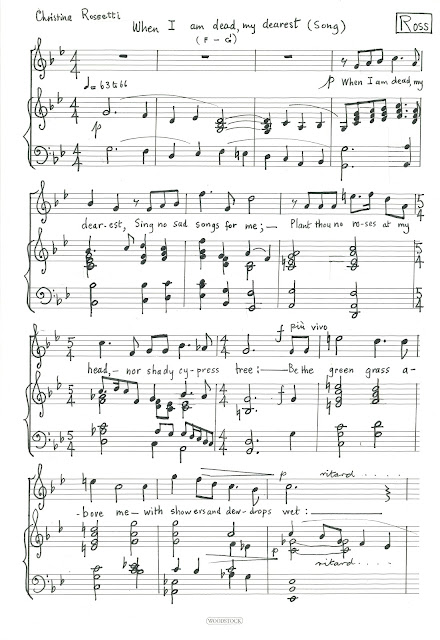Margaret Wegener :a musical life and legacy 1920 – 2020
It is a unique opportunity to be able to explore and have access to the complete output of a composer’s life work. Being able to see the creative working and reworkings of their manuscript from initial inspiration through to the finished work provides a deeper understanding of them as a musician – and you can gain an appreciation of their musical life as their influence and outreach in the community becomes evident. Not to mention discovering beautiful music!
In 2023, a collection was donated to Auckland Libraries Heritage Collections of the life work of composer Margaret Wegener. While she is not a widely known composer, being British born, she has an amazing story of a life filled with music which continued to enjoy even after her move to Auckland in 2005 aged 85.
She had her struggles. She married a German directly after the second world war and because of his nationality, she ended up having to be the breadwinner for the family because he found it difficult to hold down a job – which you can imagine would not have been easy. She also faced much discrimination as a woman composer, finding it virtually impossible to get her music published or even performed. The solution to that was to write under a pseudonym, which she did very reluctantly.
 |
| Image: When I am dead, my dearest Manuscript written under the pseudonym M. Ross. NZMS 4039 Series 1C. |
Through much perseverance and through being pro-active, eventually, Margaret's compositions were published by OUP (Oxford University Press), Royal School of Church Music, Da Capo Music and Musica Ariosa, and endorsed by composers such as Ralph Vaughan Williams, Herbert Howells, John Rutter and Andrew Carter. She was awarded composition prizes in the UK and Canada right up to her 80s. Apparently, she often lied comprehensively about her age, or she would have been disqualified, as many of these were essentially ageist and discriminatory against over 40s, but she was always determined to get her name out there one way or other. While in England she released three CDs of her music: Songs (featuring renowned English baritone Stephen Varcoe); Choral music; and Chamber music. At least one of her CD covers features her own art work.
 |
| Image: Album cover of CD “A sympathy with sounds” featuring a selection of Margaret’s choral music and released in 2004. |
In 2005 Margaret immigrated to New Zealand to live with her daughter near Auckland, where she continued to compose and to promote her music. New Zealand musicians who have performed her works include Waitakere City Orchestra (dir. Brigid Bisley), Musica Sacra (dir. Indra Hughes), Cantorum (dir. Iain Tetley), Margo Knightbridge (singer), The Three Mezzos, Ben Hoadley (bassoonist), William Green (pianist), members of the Auckland Philharmonia Orchestra, and members of Auckland Lieder Society. She also went on to release a fourth CD, of orchestral music, conducted by Hamish McKeich and featuring Cameron Barclay (of the Ten Tenors).
Margaret Wegener died in Takou Bay, Northland, on 16 September 2020
aged 100
The
collection itself (NZMS 4039) shows what a vibrant and busy musical life she
enjoyed. It encompasses a wide range of music from a sung grace for boarding
school students, poems that she wrote and set to music, a lot of vocal and
choral music, and instrumental music as well as full orchestral works. Margaret
was involved with many school productions and composing workshops which can be
discovered in the collection. Some of it is manuscript and some of it is
published and some of it is copies of manuscript. There are also fragments of
works that didn’t make it through the creative process or were untitled.
 |
| Image: Initial writing of the poem The Tree of Life. NZMS 4039 Series 7. |
 |
| Image: 'Tree of Life' poem for unison choir and organ or piano. NZMS 4039 series 3B. |
 |
| Image: Full score manuscript of the string quartet and the violin part published by Da Capa Music Ltd. NZMS 4039 series 4D. |
On 30
May 2024, a concert was organized, in collaboration with Auckland
Philharmonia’s Aspiring Musicians programme, and other musicians, to celebrate
and highlight this unique composer and her collection. This was also an
occasion to get her music more widely heard, as it well deserves. It was
recorded for archive and podcast on the Library’s Podcast channel.
 |
| Image: The Amada Quartet performing Margaret Wegener’s string quartet at the concert on 30 May |
Her music is very accessible to the ear – in fact, she hated the avant-garde; music had to have a tune. There’s a story that she once attended a lecture in which some bigwig was pontificating about atonal techniques, and despairing of the total lack of melody, Margaret offered to play one of her own compositions. Instead, she apparently improvised some horrible plonking and random slapping of keys with great flourish and aplomb – to be warmly praised by the lecturer. She turned to the audience and explained that she had just made it up, as she went along, and no music without true melody could be properly called music, and she swept out (amidst cheers). A fitting anecdote of one who was making beautiful music until her last breath.
The collection is readily accessible for anyone who would like to explore Margaret’s work. You can fill out a Research enquiry form or make an appointment to view the material
Author: Marilyn Portman, Associate Curator Music


Comments
Post a Comment
Kia ora! Please leave your comment below.